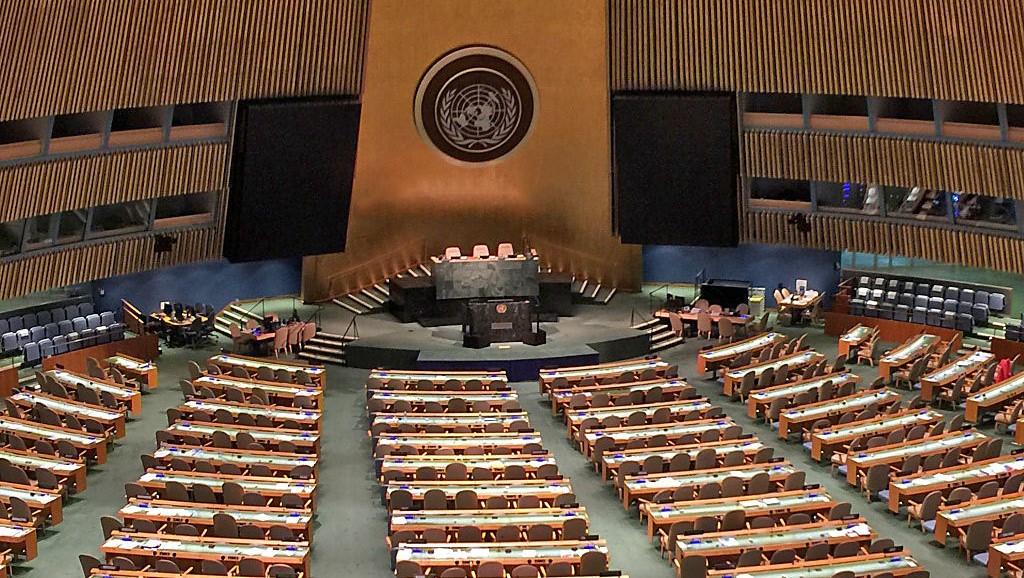The UN just took on antibiotic resistance, but can diplomacy help us combat disease?
The United Nations General Assembly hall in New York, April 2016.
In a meeting of the UN General Assembly on Wednesday, world leaders committed to toughening regulation of antimicrobials and encouraging development of new antibiotics and treatments, among other measures. The agreement was an exceptional move for the group, which has only taken up three other health issues in the past — HIV, non-communicable diseases and Ebola.
Antimicrobial resistance happens when bacteria, parasites, viruses and fungi adapt to drugs previously used to combat them — and globally, the problem is growing. In 2014, researchers in the UK estimated that 700,000 people worldwide die of drug-resistant infections each year, and that the death toll could climb to 10 million people annually by 2050 — claiming even more lives than cancer and diarrheal diseases do now.
Of the many forms that antimicrobial resistance takes, health officials are particularly concerned about growing resistance to the antibiotics that treat everything from common STIs to urinary tract infections, pneumonia and tuberculosis.
But even a freshly inked agreement at UN headquarters may not kill a question that many have been asking since the meeting was put on the books. Namely, how much can a political body like the UN — usually focused on economics and international security — do to halt superbugs?
Laura Kahn, a physician and research scholar at Princeton University, says actually, international cooperation is our best shot at fighting antibiotic resistance. That’s because the causes of antibiotic resistance are rooted in issues like the global economy, food security and the environment.
“For us, antibiotics are the foundation of modern medicine, but we can't forget that agriculture, and the food security that it provides, is the foundation of civilization itself,” Kahn says. “And so for a lot of countries that don't have food security, they still have many, many hungry people. And let's not forget that the United States has some hungry people too. This is a really difficult balancing act — between figuring out whether or not we can feed ourselves sustainably and still have our antibiotics, too.”
Kahn says along with the US, the world’s top total users of antibiotics are India and China. Of the approximately 1 billion people worldwide who lack access to public sanitation, 600 million live in India, where open defecation has led to high rates of diarrheal diseases, malnutrition and other ailments. As a result, antibiotics — available over the counter in India — are in frequent use, leading to what Kahn calls “some of the most resistant bacteria in the world.”
And in China, where some of the world’s largest pig farms feed the world’s largest population, researchers have gotten a crash course in how our widespread use of antibiotics in animal husbandry is changing the environment. Kahn says one study found that antibiotic-resistant gene residues in the manure of large Chinese swine farms were up to 28,000 times greater than levels at farms that don’t use antibiotics.
“And of course, all of this manure gets into the soil and the waterways and the coastal waters,” Kahn says. “Ultimately, we are altering the global resistome in ways that we don't understand. Many of the antibiotics that we have come from soil bacteria, and so by placing all of this manure with increased levels of antibiotics and resistance genes [in the soil], resistant bacteria mixes in with the soil microbes. It's not good.”
Using metagenomics, scientists have extracted DNA directly from soil and discovered antibiotic resistance genes all over the world.
“They're in the Arctic permafrost, they're in Antarctic lakes,” Kahn says. “They appear to be ancient and everywhere. And by blasting the environment with all of our antibiotic use, we are increasing the expression of these genes.”
But if anything, Kahn says, the spread of antibiotic resistance in the environment underscores the need for a coordinated effort like the UN’s to address the issue — with solutions ranging from improving public sanitation to encouraging development of antibiotic alternatives.
“It's a major global problem, involving humans, animals, and the environment,” Kahn says. “I just want to put a plug in to the ‘one health’ concept, and this is the simple concept that human, animal, and environmental health are linked. And because they are linked, we must address complex issues such as antimicrobial resistance in an interdisciplinary way. That's the only way we can do it.”
This article is based on an interview that aired on PRI's Science Friday.
